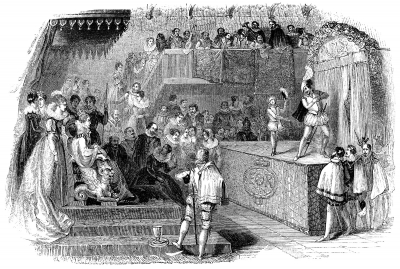
Lord Chamberlain’s Men, also called Chamberlain’s Men, a theatrical company with which William Shakespeare was intimately connected for most of his professional career as a dramatist. It was the most important company of players in Elizabethan and Jacobean England.
The records of performances given at court show that they were by far the most favoured of the theatrical companies. Their only rival was a company known during Elizabeth I’s reign as the Admiral’s Men and after that as Prince Henry’s Men. From the summer of 1594 to March 1603 the Lord Chamberlain’s Men seem to have played almost continuously in London. They undertook a provincial tour during the autumn of 1597, however, and traveled again in 1603 when the plague was in London. The company went on tour during part of the summers or autumns in most years thereafter.
In the autumn of 1599, the company was rehoused in the Globe Theatre, built by Richard and Cuthbert Burbage on the south bank of the Thames, due west of London Bridge at Southwark. This was the company’s most famous home. Profits there were shared between members of the company as such and the owners of the theatre (called “housekeepers”), who included the two Burbages, Shakespeare, and four others. Shakespeare was the company’s principal dramatist (he also acted with them), but works by Ben Jonson, Thomas Dekker, and the partnership of Francis Beaumont and John Fletcher were also presented. About 1608 another theatre, in the converted monastery of the Blackfriars, became the winter headquarters of the King’s Men. This was also managed by the Burbages, and profits were shared in a manner similar to that followed at the Globe.
Shakespeare, who had retired to his home town of Stratford-upon-Avon, died in 1616. Richard Burbage died in 1619. The longest-surviving member of the original company was John Heminge, who died in 1630. The company itself ceased to exist when, at the outbreak of the English Civil Wars in 1642, the theatres were closed and remained so until the Restoration 18 years later.
Credit : Britannica
Picture Credit : Google




